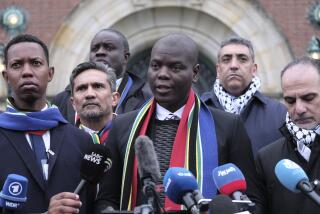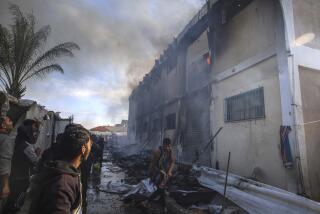Overdue Shift on Africa
- Share via
The decision Monday by the U.N. Security Council to set up a war crimes tribunal to try Foday Sankoh, leader of Sierra Leone’s murderous Revolutionary United Front (RUF), and his lieutenants aims to bring to justice those responsible for West Africa’s most savage civil war. This, along with Washington’s decision to help train West African forces for a beefed-up peacekeeping mission in Sierra Leone, can reverse Western policy blunders that gave Sankoh free rein to pillage the country and will provide the assistance that the weak government in Freetown needs to put down the decade-long civil war.
For the Clinton administration, the training mission and its backing of the tribunal represent a welcome reversal of its position on a 1999 U.S.-brokered peace agreement that included Sankoh and his thugs in the government. That deal exonerated Sankoh and put him in charge of the country’s diamond mines; he promptly used those riches to continue his insurgency. To compound the failure of Western policy, the United Nations tried to enforce the peace with a ragtag army of badly equipped, ill-trained troops, which were easily overrun by the RUF’s boy soldiers. Sankoh is now in custody awaiting trial.
The U.N. resolution to prosecute Sankoh and his henchmen comes late but is welcome. RUF troops are responsible for tens of thousands of summary executions, mutilations and rapes in what was proclaimed a political movement but never rose above the status of criminal gang.
In working out the details of how the court will operate, it is important that it receives a broad mandate to prosecute all those responsible for the atrocities, that it has adequate funds to carry out thorough investigations and that it is backed by a strong international presence to ensure that justice is meted out evenhandedly.
In authorizing the tribunal, the U.N. has recognized that its peacekeeping efforts got a black eye in Sierra Leone. It now has agreed to boost the peacekeepers’ mandate and numbers. Most of the additional troops will come from Nigeria and other West African nations. President Clinton agreed to spend $20 million to train and equip them, which is commendable. But carrying out the peacekeeping operation will cost hundreds of millions more.
The U.N., largely to meet U.S. congressional resistance to funding weak, ineffective peacekeeping, has agreed to give its troops the authority to enforce peace agreements, not merely witness their unraveling. That will take more money, and Congress should appropriate it. This is a bold move by a United Nations too often reluctant to take on the wars of Africa, and it offers the people of Sierra Leone a real chance for peace.
More to Read
Sign up for Essential California
The most important California stories and recommendations in your inbox every morning.
You may occasionally receive promotional content from the Los Angeles Times.













